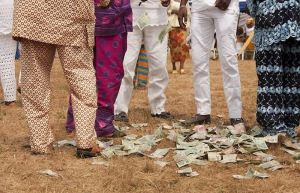In the last couple of weeks the Nigerian news space has been awash with the abuse of the Naira and arrest by the Economic and Financial Crime Commission, EFCC, of some popular personalities in the country.
Prominent among those arrested were Bobrisky who was arrested and sentence to six months imprisonment in Lagos.
While the news of Bobrisky was yet to settle down, another socialite, Cubana Chief Priest was arrested by EFCC. FOR Naira abuse.
Cubana Chief Priest was however, luckier than Bobrisky because he was granted bail to to of N20 million.
After his bail, the Chief Priest has visited the EFCC office for further interrogations.
Report, however, stated that upon investigation of his abuse of the Naira, the Chief Priest and the EFCC agreed on plea bargain.
But narrating his experience at the hands of the EFCC, Chief Priest has advised Nigerians to avoid getting into trouble with the EFCC. Noting that it was not a pleasant experience.
Taking to Instagram after his second appearance in court,the Chief Priest, real name, Paschal Okechukwu wrote, “Court day !! Problem No Good Oh, @officialefcc * No Dey Joke Oh !!!! Better Stay Away From Their Wahala. I’m Sure You Will Not Love To Pass Through This Kinda Stress I’m Passing Through.”
IVNTV NEWS reports that that for most Nigerians to stay away from EFCC drag net, they need to know the CBN law on abuse of the Naira.
According to the Central Bank of Nigeria, CBN; some ways the Naira can be abused include:
- Spraying: It is against the law to spray the Naira banknotes at occasions.
- Writing: It is against the law to write on banknotes.
- Stapling: It is against the law to staple the banknotes as the pins can cause corrosion of the banknotes.
- Tearing: It is also against the law to tear the banknotes
- Soiling: It is against the law to dance/stamp on the Naira banknotes. Do not stain the banknotes with oil or ink, as this is also a form of defacing.
- Sale: It is against the law to sell currency banknotes.
- Mutilation: A person who tampers with the Naira note or coin is guilty of an offence, punishable by law (CBN Act Section 21).
- Rejection: It is against the law to reject the Naira (Section 20 subsection 5).
![]()

